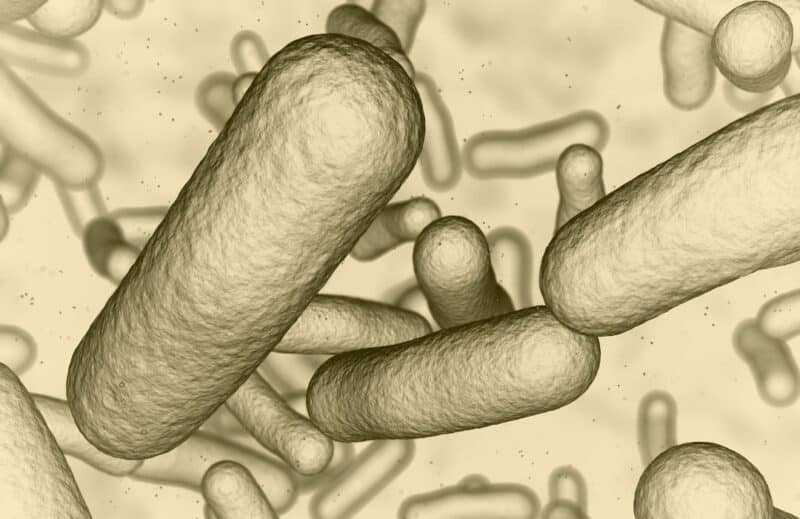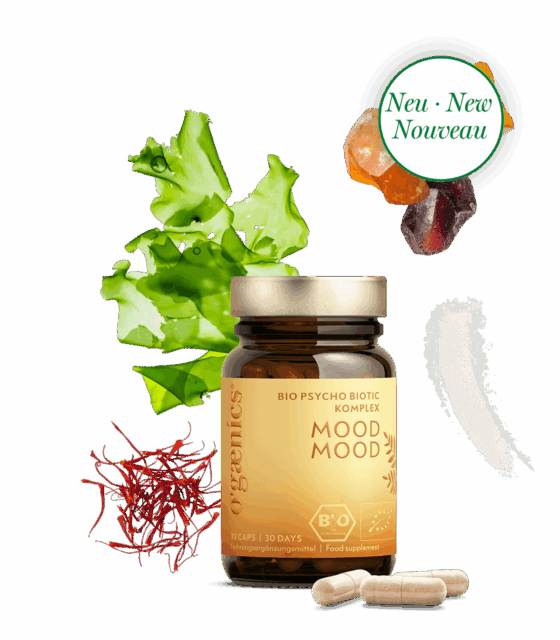Mood, focus and even your sleep depend on it – what you can do to strengthen the connection
We all know the feeling: a sinking feeling in our stomach before an important decision, butterflies in our stomach when we are in love – or a knot in our stomach when something worries us.
These expressions are no coincidence. They describe a fascinating biological network that scientists now call the gut-brain axis – a constant, bidirectional communication between our digestive system and the brain.
And this connection is much more powerful than was long thought.
Your gut microbiome communicates with your brain via the gut-brain axis
Around 100 trillion microorganisms live in your gut – more than cells in your entire body. This gut microbiome is like a highly complex ecosystem that influences your health on all levels: from digestion and your immune system to your mood and mental performance.
Research shows:
If the balance of these bacteria is disturbed – for example by stress, medication, sugar, lack of sleep or a highly processed diet – this can have a direct impact on the brain via the gut-brain axis.
This is because communication takes place on several channels:
- Via nerve pathways, especially the vagus nerve – your “information highway” between your stomach and head
- About immune messengers that promote or inhibit inflammation
- And via neurotransmitters such as serotonin, dopamine or GABA – many of which are formed in the gut
In fact, around 90% of the body’s serotonin is produced in the gut – the “happiness hormone” that regulates our mood.
GABA and the gut-brain axis: the calming neurotransmitter

GABA, or gamma-aminobutyric acid, is one of the most important neurotransmitters in your central nervous system – a chemical messenger through which nerve cells communicate with each other.
While neurotransmitters such as dopamine have an activating effect, GABA is the counterbalance to this:It is the brain’s most important inhibitory neurotransmitter.
This means that GABA slows down excessive neuronal activity, calms the nervous system and protects the brain from sensory overload.
Specifically, this means:
– It reduces stress and anxiety by lowering the excitability of nerve cells.
– It promotes relaxation, serenity and emotional balance.
– It supports sleep, especially falling asleep and the transition to deeper sleep phases.
– It can improve concentration and clarity because there is less “noise” in the nervous system.
– It has a neuroprotective effect – i.e. it protects nerve cells and brain functions.
How the gut produces GABA – and what this means for the gut-brain axis
Most of the body’s GABA is produced in the central nervous system. However, the gut plays a crucial role in the regulation of this system. Even though GABA production in the gut is comparatively small, it has a direct effect on communication along the gut-brain axis.
The science behind it:
Several strains of Lactobacillus and Bifidobacterium in the gut – including certain strains of Lactobacillus brevis, Lactobacillus reuteri, Lactiplantibacillus plantarum and Bifidobacterium adolescentis – can produce measurable amounts of GABA.
This GABA production influences the enteric nervous system (the “abdominal brain”) and sends signals to the brain via the vagus nerve.
This creates a calming feedback loop between the gut and the brain – which explains why you can literally find peace in your stomach.
Psychobiotics: When bacteria improve your mood

These GABA-producing bacteria are known in science as psychobiotics – they are microorganisms that have a positive influence on the brain and the psyche via the gut.
Particularly active psychobiotic strains are:
- Lactobacillus brevis LBR01
- Lactobacillus reuteri LRE03 and LRE11
- Lactiplantibacillus plantarum LP01, LP09, LP14
- Bifidobacterium adolescentis BA02
- Bifidobacterium longum DLBL09
These strains were able to produce significant amounts of GABA in studies – especially L. reuteri and L. plantarum.
They also strengthen the intestinal barrier, have an anti-inflammatory effect and activate neuronal signaling pathways (e.g. p-STAT3) that are associated with emotional balance and stress resilience.
In short:
Certain bacteria in the gut can biochemically make your brain feel more relaxed, stable and clear.
The solution: use the gut-brain axis for more inner balance
-
Mood Mood
30-day cure with BIFIZEN® Psycho Biotics, Safr'inside™ organic saffron and B12 for psyche, nerves and energy39,90 €2.493,75 € / kg
If you want to support the gut-brain axis holistically, it’s worth starting where both systems talk to each other: with the GABA-producing gut bacteria – and with the nutrients they and your nervous system need to stay in balance.
One of the most innovative formulations for this is the Mood Mood Bio Psycho Biotic Complex from Ogaenics:
- It combines clinically researched psychobiotic strains that produce GABA in the intestine with
- Organic saffron extract to promote emotional balance and serenity,
- plant-based organic magnesium, which contributes to the normal functioning of the nervous system,
- and organic vitamin B12, which supports mental function and energy production.
This unique combination works on several levels of the gut-brain axis simultaneously:
It strengthens the microbiome, harmonizes communication between the gut and brain, supports the formation of calming neurotransmitters and helps your body to cope better with stress – naturally, plant-based and scientifically proven.
This creates a new form of balance –
from within, between belly, head and soul.
👉 F ind out more about Mood Mood and discover how you can use your gut-brain axis for your well-being and find inner peace with natural psychobiotics and saffron extract.







 No products in the cart.
No products in the cart.